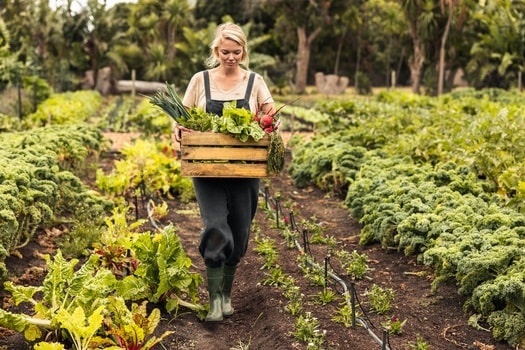Are we on the brink of a transformative “Power Shift” in the way we produce and consume our food? A groundbreaking report from the Global Alliance on the Future of Food sheds light on the intricate dance between our food and energy systems, revealing a web of challenges and opportunities that demand our immediate attention. Join us on a journey through the pages of this report, where the urgent call for collaborative efforts and systemic changes in fossil fuel-driven agriculture takes center stage.
Introduction
In a world where the connections between what we eat and how it’s produced are often overlooked, the ‘Power Shift’ report serves as a wake-up call. Released by the Global Alliance on the Future of Food, this report plunges into the heart of the complex relationship between our food and energy systems. As the need for change becomes increasingly urgent, the report emphasizes the crucial role collaborative efforts and systemic shifts play in addressing the pressing challenges posed by fossil fuel-driven agriculture.
Why should we care about the intricate ties between our food choices and the energy systems that power them? The report, titled ‘Power Shift,’ unveils a narrative that goes beyond mere sustenance. It reveals the deep-rooted connection between the fossil fuel industry and industrialized agriculture, demonstrating how our food choices impact not only our health but also the environment and the global community.
What will we see and learn here?
This article delves into the detailed outcomes of the ‘Power Shift’ report, dissecting the critical issues it raises and exploring the proposed solutions. From the interconnectedness of food and fossil fuels to the call for systemic change and the emergence of sustainable alternatives like agroecology, each section unfolds a vital aspect of the report, inviting readers to contemplate the future of our food systems.

Interconnectedness of Food and Fossil Fuels
The report highlights the deep-rooted connection between the fossil fuel industry and industrialized agriculture. Fossil fuel-driven processes, from synthetic fertilizers to pesticides, significantly impact public health, contaminate the environment, and contribute to soil, air, and water pollution.
Impact on Health and Nutrition
Experts emphasize the far-reaching consequences of fossil fuel-driven intensive agriculture on human health and nutrition. The production of agro-chemical-treated foods has been linked to various health issues, with acute pesticide poisonings affecting a staggering 44% of farmers, farmworkers, and pesticide applicators annually.
Industrial Agriculture and Environmental Degradation
The report identifies fossil fuel-driven intensive agriculture as a major contributor to biodiversity decline and widespread pollution. The current focus on high-volume production rather than the provision of safe, nutritious food exacerbates environmental issues. The excessive use of energy-intensive processes and synthetic inputs further intensifies the ecological impact.
Role of Small-Scale Farmers
Small-scale farmers, responsible for a significant portion of Asian agricultural production, are often compelled to adopt fossil fuel-related methods for higher productivity. The report advocates for empowering these farmers to embrace eco-friendly practices such as organic, agroecology, regenerative, and sustainable diets.
Call for Systemic Change
The report emphasizes the need for a fundamental shift from fossil fuel-driven agriculture to sustainable alternatives. The upcoming ‘Power Shift’ webinar aims to present actionable recommendations, urging global leaders to prioritize the phase-out of fossil fuels in the food sector.
Agroecology as a Sustainable Alternative
Agroecology emerges as a key solution, promoting socially, politically, and economically sustainable food production. By minimizing the use of fossil fuel-derived pesticides and fertilizers and prioritizing local decision-making, agroecology offers a holistic approach to address health, nutrition, and environmental concerns.
Myths Surrounding Productivity
The article dispels myths regarding the productivity of sustainable and organic farming compared to conventional methods. It calls for increased investment in research and development for low-cost sustainable agricultural technologies and methods.
Climate-Resilient Agriculture
The need for intelligent climate-resilient agriculture is emphasized, focusing on technologies for sustainable water utilization, soil health improvement, and reduction of greenhouse gas emissions. The report suggests a consolidated and localized approach, prioritizing marginalized and small-scale farmers.
Conclusion
As we navigate the intricate dance between our food and energy systems, the ‘Power Shift’ report from the Global Alliance on the Future of Food emerges as a beacon, illuminating the path toward a more sustainable and nourishing future. The revelations presented demand not just our attention but immediate action. In conclusion, let’s reflect on the journey through these critical findings and explore the call to action that beckons us all.
Reflecting on the Revelations
The interconnectedness of food and fossil fuels is not merely a theoretical concept but a tangible reality affecting public health, the environment, and global well-being. From the detrimental impact of synthetic fertilizers and pesticides to the alarming health consequences of agro-chemical-treated foods, the report paints a vivid picture of the challenges we face in our current agricultural practices.
The role of small-scale farmers, often constrained by the necessity of fossil fuel-related methods, underscores the urgency for empowering them to embrace sustainable alternatives. Agroecology emerges as a key solution, presenting a holistic approach that not only benefits health and nutrition but also promotes social, political, and economic sustainability.
Dispelling myths surrounding the productivity of sustainable farming and advocating for increased investment in research and development mark crucial steps toward dismantling barriers to change. The emphasis on climate-resilient agriculture directs our attention to intelligent technologies that can reshape the way we approach water utilization, soil health, and greenhouse gas emissions.
The Call to Action
As stewards of our planet and consumers of the fruits it bears, we are called to act in the face of these revelations. The upcoming ‘Power Shift’ webinar provides a platform for actionable recommendations, urging global leaders to prioritize the phase-out of fossil fuels in the food sector. This is not merely a suggestion but a rallying cry for systemic change.
- Advocate for Sustainable Practices: Join the movement advocating for the empowerment of small-scale farmers to adopt sustainable, eco-friendly practices like agroecology, regenerative farming, and sustainable diets.
- Challenge Misconceptions: Be a voice in dispelling myths surrounding the productivity of sustainable and organic farming. Encourage informed discussions that pave the way for a more nuanced understanding of alternative agricultural methods.
- Support Research and Development: Call for increased investment in research and development for low-cost, sustainable agricultural technologies. This investment is crucial for creating viable alternatives that can compete with conventional methods.
- Prioritize Climate-Resilient Agriculture: Support initiatives that focus on intelligent climate-resilient agriculture. Advocate for technologies that enhance sustainable water utilization, improve soil health, and reduce greenhouse gas emissions.
- Participate in the ‘Power Shift’ Webinar: Engage with the insights and recommendations presented in the upcoming ‘Power Shift’ webinar. Be a part of the dialogue that shapes the future of our food systems.
So, the ‘Power Shift’ report beckons us to be architects of change. The choices we make today determine the legacy we leave for future generations. Let us heed the call, unite in our efforts, and embark on a journey toward a more sustainable, equitable, and nourishing future for our planet and its people.



